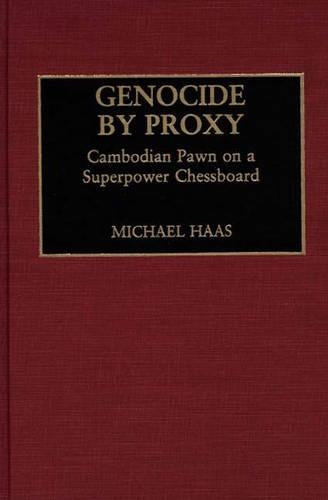
Genocide by Proxy: Cambodian Pawn on a Superpower Chessboard
(Hardback)
Publishing Details
Genocide by Proxy: Cambodian Pawn on a Superpower Chessboard
By (Author) Michael Haas
Bloomsbury Publishing PLC
Praeger Publishers Inc
30th December 1991
United States
Classifications
Tertiary Education
Non Fiction
Revolutionary groups and movements
Revolutions, uprisings, rebellions
Political oppression and persecution
327.596
Physical Properties
Hardback
400
Width 156mm, Height 235mm
765g
Description
A detailed, scholarly reassessment of developments in Cambodia since December 25, 1978, when Vietnamese combat soldiers expelled the ruthless Pol Pot regime. "Genocide by Proxy" is an account of a country at war and of a people consigned to the role of pawn in world politics. Michael Haas contends that Cambodia became an arena for superpower conflict and thus could only find peace when the superpowers extricated themselves from the country. In providing perhaps the best explanation of the causes of the Cambodian tragedy, Haas exposes the narcissism that reigns when one state forces another to be its pawn. Haas' analysis entails a study in comparative foreign policies, an exercise that has theoretical merit for political scientists in search of paradigms of political behaviour. Challenging the conventional view of Vietnam as the aggressor, this volume vindicates Vietnam's role in the Cambodian conflict, while at the same time revealling the treachery of U.S. foreign policy toward Cambodia. Much of the information in the book is based on Haas' own interviews with more than 100 key international figures and on primary documents. In an introductory chapter devoted to the basic facts of how genocide by proxy began, Haas sets forth the history of Pol Pot's rise and fall. The first three parts of the book, which deal with style of the film "Rashomon" and detail how each country perceived events and framed policies to use the conflict fo its own ends. The final chapter suggests an alternative to this world of superpower chess games. The two appendices contain records of voting in the United Nations on Cambodia.
Author Bio
MICHAEL HAAS is Professor of Political Science at the University of Hawaii at Manoa. He edited Korean Reunification, and authored The Pacific Way, The Asian Way to Peace (all Praeger, 1989), Cambodia, Pol Pot, and the United States: The Faustian Pact (Praeger, 1991), and is working on a new book to be published by Praeger, Polity and Society: Philosophical Underpinnings of Social Science Paradigms.
